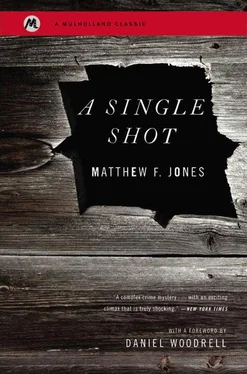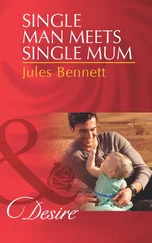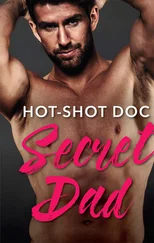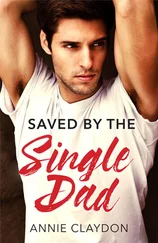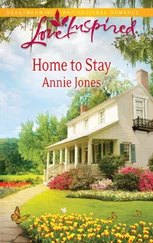His ingress commences a cacophony of caws and squawks. To his left, a Scotch pine shimmers and bounces beneath the weight of hundreds of crows that have gathered there to escape from the storm. Sweeping his eyes and the shotgun left-to-right, John feels an edgy, life-lived-in-a-second adrenaline tug that must be what soldiers feel when going into battle. Barely glancing at the patch of nettles behind which he shot the girl, he walks straight for the cave, stopping before he gets there next to the pond, which is roily and brown from the recent rain. There is no sign of the deer carcass. No footprints mar the bank, though mostly it’s rock, and where it isn’t, the rain would have washed them away.
John wishes he were a smoker so that he could sit and slowly smoke a cigarette before going farther. He pulls out his water bottle, drinks, then puts the bottle away. The drizzle is now a mist more than a rain. Heavy, post-storm air covers the bowl like a warm, drenched blanket. John’s sweat smells of beer. He considers removing his poncho, but doesn’t want to carry it. The cave’s entrance is mostly fog-filled. Approaching it, John wonders if the cadaver will be at all decomposed.
He picks up the shovel and pick, leans them and his shotgun against the quarry wall, then pulls off his pack, takes out his flashlight, and lays the pack on the ground.
He squats down, switches on the light, and cautiously enters the cave. Water is trickling somewhere. John shines his light at the sound. In the back of the cavern, a thin, sporadic drip comes through the ceiling. He directs the beam farther right, then blinks his eyes several times to make sure he is seeing correctly. Hadn’t he left the girl’s face undraped? Now the sleeping bag is covering it. In his agitation, he tries to stand up and bangs his head against the ceiling. He curses and rubs the hurt. Then he waddles over to the sleeping bag, grabs the top, and yanks it back. The lion grins up at him. The girl is gone.
He sits on the hill above the trailer, watching it through his binoculars. Dampness stiffens his joints like the beginning of a flu. Melancholy—for the girl’s lost body, for his solitary life, for what he foresees as a quick or imprisoned end to it—takes hold like the germ itself. His thoughts dance arrhythmically, whirl like drunks trying to do a four-step. His senses play tricks on him. Shrouded by fog, the silver-white trailer floats like a ghost in and out of his vision. Flying birds look like rocks hurled into the mist. Whole trees disappear. Nobie’s hollow shout, at exactly 4 p.m., echoes up from the valley like the reverberating clank of hell’s gate.
He watches the herd, like a row of condemned souls, sullenly parade in single file from the upper pasture toward the barn. Later, he hears the electric milkers whir and watches steam rise up from where he knows the barn to be, then vanish in the mist.
He eats an apple and the two remaining peanut-butter-and-jelly sandwiches in his pack. With his Bowie knife, he files his fingernails to the quick. In the damp grass between his legs, he draws a circle, then repeatedly throws the knife into its center. Later, touching his three-day growth of beard, he remembers his father had worn one for maybe six months. It made him look old. Then he turned mean, got sick, and died. John hacks with the knife blade at the growth. He cuts his cheek. He dabs with his shirttail at the spot until the bleeding stops. He puts the knife away. He folds his hands, closes his eyes, wonders if there’s a God and, if so, what His plans for John’s future are. The gray day gets grayer, darker. Dusk comes to the mountain. The drizzle stops, but the fog stays put. No one approaches the trailer. No one leaves. John remembers his little son crying, “Mommy.” He wishes it were so easy.
Down the hill to his left, from a thick patch of fog, sound the stomp and suck of footsteps in the wet ground. He grabs the 12-gauge, cocks it, flicks off the safety, and dives behind a spruce bush. Ten feet above the dirt path, he nervously waits for whatever it is to emerge from the mist.
Clomp-suck. Clomp-suck.
Slowly comes a horse’s head, with its pointy ears and sloping snout, then its long neck and muscular torso, atop which elegantly sits the dead girl.
John drops his gun and screams.
The horse shies. Then rears. The girl tries to rein him in.
“Whoa! Easy, boy! Easy, now!” The horse comes back down onto its four feet, hop-steps sideways, then stands there in the path, skittishly tossing its head. “Steady, Diablo. Stea-dee.” Now she talks soothingly to the animal, while rubbing its neck. “John Moon,” she says.
John’s heart echoes loud in his ears. He leans down and picks up his gun. The girl shakes her head. “What do you mean, calling out like that?”
“Thought you was somebody else.”
“Who’d make you scream that way?”
“A ghost.”
“Jesus, John Moon.”
“Sorry ’bout it.” He steps forward, kisses the wet nose of the horse, Nobie’s big dappled-gray Arabian. “Was sleepin’.”
“In the rain?”
“Nappin’s all.”
“You and Mr. 12-gauge?”
“Thought I might see a rabbit or somethin’.”
“On the preserve or on my daddy’s land?”
“Neither. I was back in further. Headin’ for home I ’bout gave out.”
“Look at you, John Moon.”
“I know it.”
“You look like you’ve seen a ghost!”
“I told ya.”
“And you’re soaked!”
“Was some storm.”
“I wouldn’t tell on you even if you were stalking a deer, John Moon. Daddy says you put to good use everything you take, which is more than can be said for most of the world.” She smiles. She’s half John’s age, but already so much he isn’t—intelligent, good-looking, self-assured. In a few years, like her brother, she will go off to college and then only occasionally come home to ride Diablo up past John’s trailer toward the woods, when she will smile and call out, “John Moon!”
“You gonna take the job Daddy offered you?”
“Ain’t decided.”
“You ought to.” She turns red, looking then like the fifteen-year-old she is. “Not everybody gets a chance to do what they love and get paid for it, too.”
“Shoveling shit and milking cows?”
“Uh-huh, John Moon.”
“How you figure?”
“ ’Cause I’m daughter to one just like you.”
John grunts.
“Daddy’d be lost without farming. He had to work in a factory, he’d die.” The horse shakes its head and blows. John steadies it with his hand. “I’m taking an economics course in summer school, John, and you know what we’re studying on?”
“What?”
“Profit sharing.”
“Good you’re gettin’ educated.”
“You know what that is?”
“Nope.”
“It’s when employees own a piece of the companies they work at. The bosses figure they’ll get more for their money from workers who share in the profits and workers work harder because they got a stake in things. What do you think about that, John?”
“Nifty.”
She laughs. “Nifty?”
“Ain’t that your word?”
“Sure. I just never heard you use it before.” The horse dances backward. John takes hold of its rein. Abbie says, “Cool your jets, Diablo.” She looks at John. “Was me, I’d suggest something like that to Daddy.”
“Like what?”
“What I just said.”
“Somethin’ ’bout jets?”
“Don’t act stupid, John Moon!”
John spits.
“I’d tell him I’d take the job if part of my pay could go toward buying a piece of his farm.”
John laughs.
“There’s nothing funny about it, John. Our professor says workers with leverage ought to use it to empower themselves.”
Читать дальше
